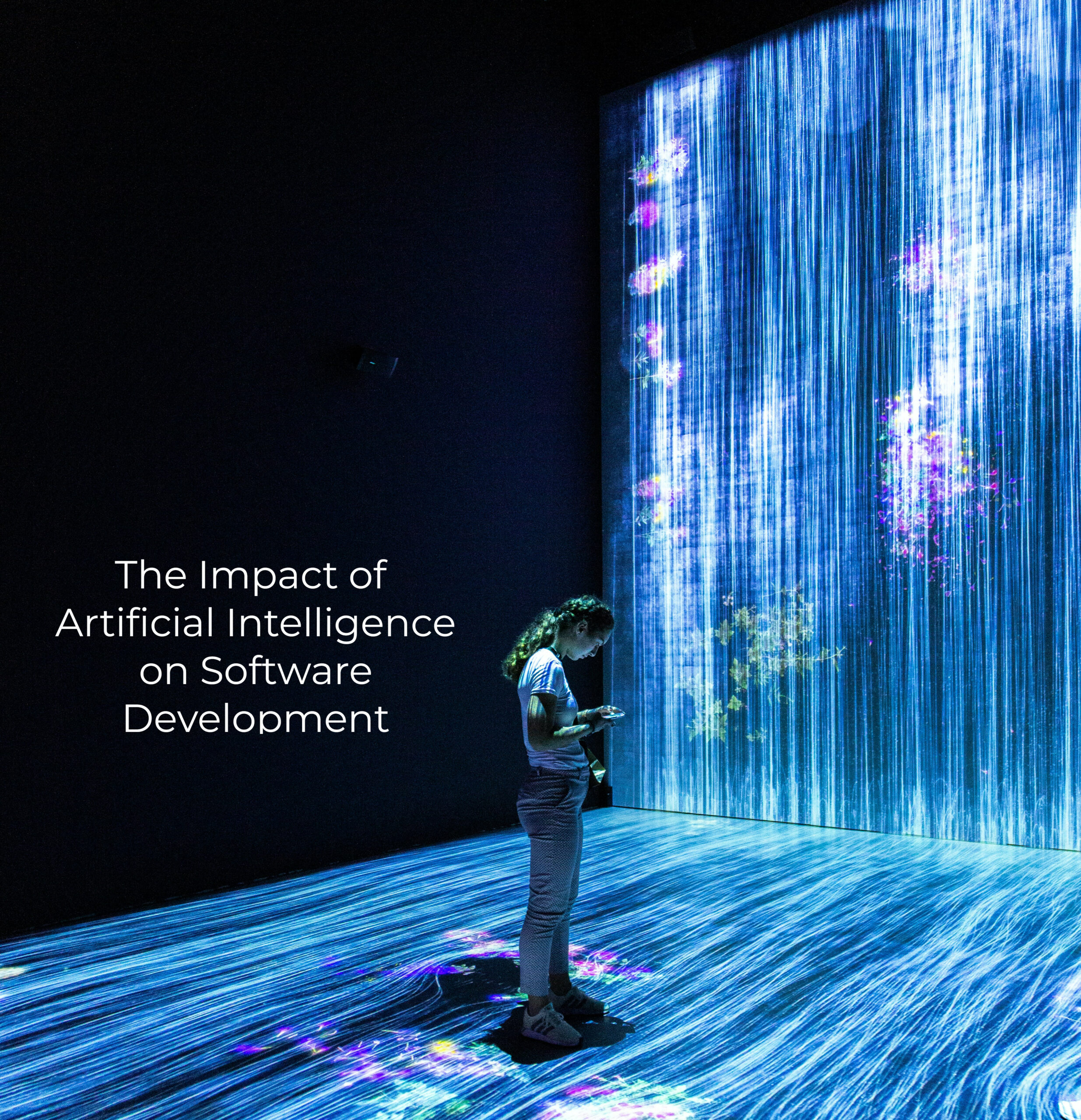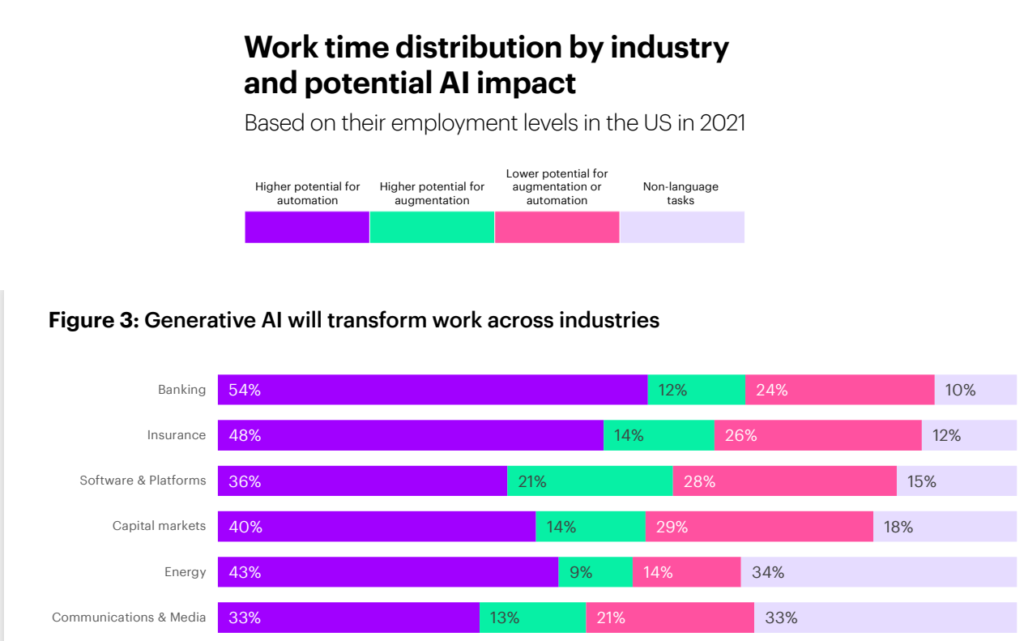
Artificial intelligence (AI) has been a disruptive factor in a number of businesses in recent years. Software development is one area where its impact is particularly notable. AI technologies have begun to transform how software is developed, tested, and maintained.
Predicting the Impact of AI on Software Development
Research studies and market trends indicate that the use of AI in software development has a bright future. According to the report by Grand View Research, the global artificial intelligence market size was valued at USD 136.55 billion in 2022 and is projected to expand at a compound annual growth rate (CAGR) of 37.3% from 2023 to 2030. A report published by Goldman Sachs stated that Generative AI such as GPT could increase global GDP by 7%($7 trillion), could boost productivity growth by 1.5%, and is likely to automate more than 300 million jobs across the US and Europe that are done manually today.

As per Accenture, banking, insurance, and software are the top three industries where Generate AI possesses a high risk of automating things. Strictly speaking about software & platforms, 36% of the task is likely to be automated by Generative AI. Many companies have already started to plan on how to use AI and reduce human intervention. In a recent report written by Bloomberg, they spoke with Arvind Krishna, the CEO of IBM, who stated that IBM is halting hiring that could be done by AI and that 30% (7,800) of employment within IBM are easily replaceable by automation within 5 years.
Advantages of AI in Software Development
The use of AI approaches in various software development processes is on the rise in the modern day. Automated code generation is one of the popular fields where AI applications are used. Few examples of AI applications are the Amazon CodeWhisperer or Github Copilot. Summarized from the articles, such as Deepcoder: learning to write programs, code2seq: Generating Sequences from Structured Representations of Code, it can be stated that, on the basis of set rules and patterns, researchers have created approaches where AI models that can generate code fragments, whole functions, or even create entire programs. In addition to increasing productivity, this also helps to lower human mistake rates and repetitious coding chores.
As per the Harvard Business Review article, AI-powered testing and debugging are another essential components that can automatically find errors, spot bottlenecks in efficiency, and provide improvements by using machine learning methods. AI can be used to automate test case generation, which helps developers increase code coverage and raise the standard of their products.
AI has also transformed the fields of documentation and natural language processing (NLP). Large Language models have made tremendous progress in producing language that is human-like, helping programmers write detailed documentation, code comments, and even context-aware code completions.
Here are some crucial areas where AI is anticipated to advance significantly
Future software development will undergo a revolution thanks to AI. Intelligent software assistants will automate refactoring, provide real-time advice, and help with code development. Automated software maintenance will find security holes and recommend patches. Code review solutions that are intelligent will improve collaboration. AI models will constantly pick up new information from code sources, offering the most recent best practices and optimizations. AI will make software development in the future more productive, efficient, and collaborative.
Academic Researches
Lubna Mahmoud Abu zohair’s research titled ”The future of software engineering by 2050s: Will AI replace software engineers?” predicts some foreseeably best practices in software engineering including
“Designing software systems at a higher level of abstraction using a model-driven approach, writing codes using pre-existing programs that can self-verify and test themselves, and being agile and quick enough to meet user requirements. By 2050, these procedures are expected to be put into operation. He adds that the majority of the stages of the software development lifecycle framework, such as requirements collecting, design, coding, testing, and maintenance, are anticipated to be automated by artificial intelligence. Software development will take much less time and expense as a result of this. However, AI systems may become uncontrollable, which is one of the difficulties that must be addressed.”
Another article in the Harvard Business Review titled ”Collaborative Intelligence: Humans and AI are Joining Forces” claimed after surveying 1500 companies that:
”Firms achieve the most significant performance improvements when humans and machines work together through collaborative intelligence.”This means that businesses can utilize automation to supplement rather than completely replace their people’s abilities. For instance, a chatbot powered by AI could help customer care agents by resolving routine questions so they can concentrate on more complicated problems.”
Disadvantages of AI
As per the article published by McKinsey, although AI serves great benefits in there are still major drawbacks that need serious attention. AI, by nature, is trained on massive amounts of data, which in turn makes them lack creativity and intuition. The algorithms of artificial intelligence work using patterns and data analysis, but they often struggle with creativity and thinking beyond the box. Human engineers are uniquely skilled at looking at issues from several angles, putting context, and developing solutions that AI systems could find difficult to replicate. They lack an understanding of the broader context of software development such as understanding user requirements, and business objectives. Moreover, there are other potential risks of technical issues and system failures if we are overly reliant on AI systems. Other than this, there are ethical concerns that make AI-powered software development more vulnerable, if the training datasets have biases or social inequalities. Beyond trained data, AI’s lack of human interaction skills, empathy, and knowledge of user needs can result in unsatisfactory user experiences.
Conclusion
The development of AI in the past and present has shown its ability to revolutionize the industry of software development. AI is transforming the way software is developed, tested, and maintained by automating tedious chores, enhancing developer capabilities, and facilitating more effective cooperation. With intelligent assistants, automated maintenance, improved collaboration, and continuous learning altering the landscape, the future of AI in software development looks quite promising. By embracing these developments, developers will be given the tools they need to produce innovative, higher-quality software more quickly. Although there is a chance that businesses may use AI to replace workers, it is important to emphasize that those businesses that combine AI with human intelligence will succeed. Otherwise, if a company relies only on AI, its development will be relatively short-lived.
